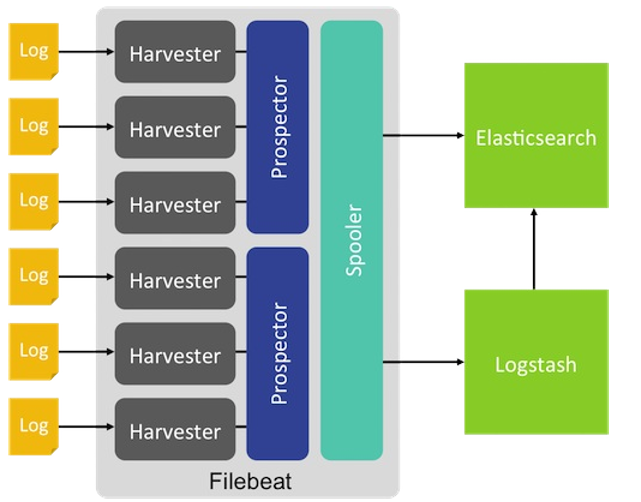filebeat的层次架构图和配置部署 -- 不错的文档 - elasticsearch 性能调优 + Filebeat配置
1.fielbeat的组件架构-看出层次感

2.工作流程:每个harvester读取新的内容一个日志文件,新的日志数据发送到spooler(后台处理程序),它汇集的事件和聚合数据发送到你已经配置了Filebeat输出。
参考:https://blog.csdn.net/gamer_gyt/article/details/52688636
3.安装配置
tar xvf filebeat-6.4.2-linux-x86_64.tar.gz cp /usr/local/src/filebeat-6.4.2-linux-x86_64/filebeat.yml /usr/local/src/filebeat-6.4.2-linux-x8 6_64/filebeat.yml.default cd /usr/local/src/filebeat-6.4.2-linux-x86_64/ [root@VM_0_6_centos filebeat-6.4.2-linux-x86_64]# cat filebeat.yml filebeat.inputs: - type: log enabled: true paths: - /tmp/messages fields_under_root: true filebeat.config.modules: path: ${path.config}/modules.d/*.yml reload.enabled: false output.elasticsearch: hosts: ["10.0.0.92:9200"]
4. 报错
Filebeat配置检测报 “setup.template.name and setup.template.pattern have to be set if index name is modified” 错误
解决方案:这个错误本身提示很明显,只要我们配置了索引名格式,就必须要同时配置setup.template.name 和setup.template.pattern,但是,我配置了这两项怎么还是不行呢,还是同样的错误,重点来了:这两项的配置必须要顶格配置,不可以和index对齐写到一个缩进级别!这个是很容易写错的,大家注意!正确的写法:
--------------------- index默认就可以了,不用配置
原文:https://blog.csdn.net/yk20091201/article/details/90756738
别人的配置文件
filebeat.inputs: - type: log enabled: true paths: - /usr/local/analyzer/test.log json.keys_under_root: true json.add_error_key: true json.overwrite_keys: true output.elasticsearch: # Array of hosts to connect to. hosts: ["192.168.0.81:9200"] index: "filebeat-testindex-%{+yyyy.MM.dd}" setup.template.name: "filebeattest" setup.template.pattern: "filebeattest-*" 原文:https://blog.csdn.net/yk20091201/article/details/90756738
#############################################
不错的文档
https://www.cnblogs.com/cjsblog/p/9517060.html
#=========================== Filebeat inputs ============================= filebeat.inputs: - type: log enabled: true # 要抓取的文件路径 paths: - /data/logs/oh-coupon/info.log - /data/logs/oh-coupon/error.log # 添加额外的字段 fields: log_source: oh-coupon fields_under_root: true # 多行处理 # 不以"yyyy-MM-dd"这种日期开始的行与前一行合并 multiline.pattern: ^\d{4}-\d{1,2}-\d{1,2} multiline.negate: true multiline.match: after # 5秒钟扫描一次以检查文件更新 scan_frequency: 5s # 如果文件1小时都没有更新,则关闭文件句柄 close_inactive: 1h # 忽略24小时前的文件 #ignore_older: 24h - type: log enabled: true paths: - /data/logs/oh-promotion/info.log - /data/logs/oh-promotion/error.log fields: log_source: oh-promotion fields_under_root: true multiline.pattern: ^\d{4}-\d{1,2}-\d{1,2} multiline.negate: true multiline.match: after scan_frequency: 5s close_inactive: 1h ignore_older: 24h #================================ Outputs ===================================== #-------------------------- Elasticsearch output ------------------------------ #output.elasticsearch: # Array of hosts to connect to. # hosts: ["localhost:9200"] # Optional protocol and basic auth credentials. #protocol: "https" #username: "elastic" #password: "changeme" #----------------------------- Logstash output -------------------------------- output.logstash: # The Logstash hosts hosts: ["localhost:5044"] # Optional SSL. By default is off. # List of root certificates for HTTPS server verifications #ssl.certificate_authorities: ["/etc/pki/root/ca.pem"] # Certificate for SSL client authentication #ssl.certificate: "/etc/pki/client/cert.pem" # Client Certificate Key #ssl.key: "/etc/pki/client/cert.key"
用一个例子来演示会更加清晰



